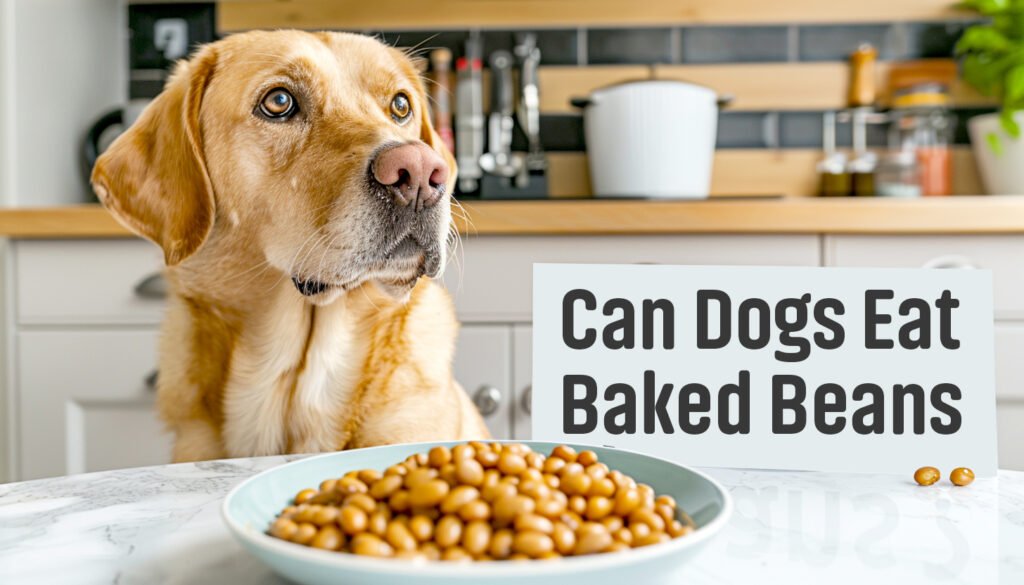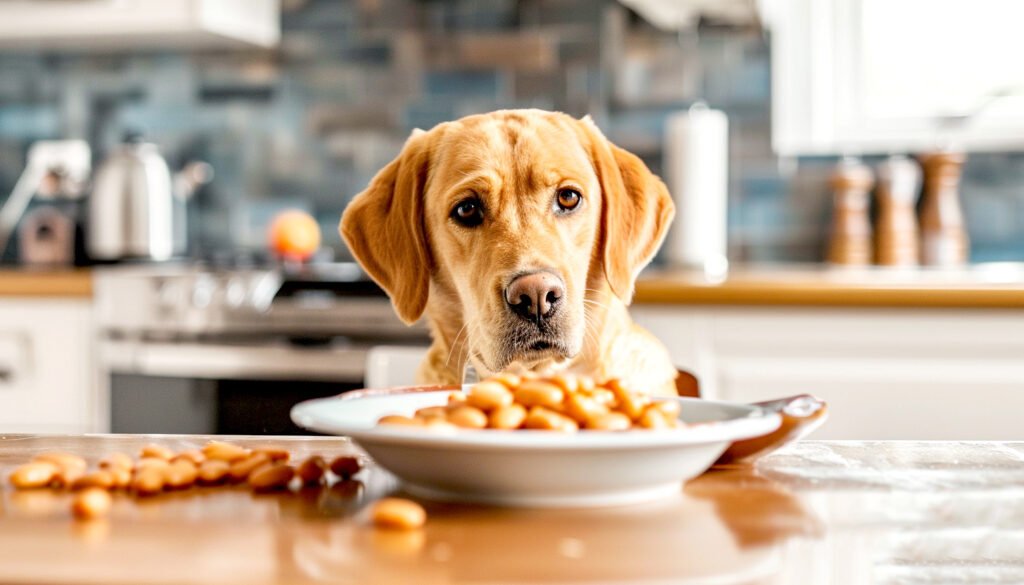Pet owners place great value in providing our furry friends with the highest standard of care, which includes providing them with a balanced and nutritious diet. Unfortunately, with so many food options available to dogs it can be challenging to determine what’s safe to feed them – one popular query being Can dogs eat baked beans?
Pet owners understandably treat our canine companions like precious members of their family, taking extra precautions when feeding their furry pals. While baked beans might seem like an irresistibly tasty treat for our furry friends, pet parents must first understand any potential adverse impacts this classic dish could have on their health before giving our pups one or two more spoonfuls!
In this article, we’ll take an in-depth look at the safety and suitability of baked beans for dogs. We will review their nutritional value as well as potential risks. In addition to that, we will discuss considerations when selecting canned or homemade varieties; all in an effort to equip pet parents with all of the knowledge needed to make informed decisions regarding their pet’s diet and well-being.
Contents
- 1 What Is Baked Beans
- 2 Can Dogs Eat Baked Beans?
- 3 Nutritional Facts About Baked Beans
- 4 Canned Beans Vs Homemade Baked Beans: Which Should You Select?
- 5 Beans and Rice: An Ideal Pairing
- 6 Specific Bean Varieties: Baked Black Beans
- 7 Key Takeaways
- 8 Conclusion: Can Dogs Eat Baked Beans?
- 9 FAQs (Frequently Asked Questions)
What Is Baked Beans
Baked beans, enjoyed by many, consist of cooked beans simmered in a flavorful sauce made of tomatoes, sugar, molasses, vinegar, and spices for maximum flavor. Common types include navy or kidney beans which are used.
Baked beans are an extremely versatile ingredient; they can serve as either an individual dish, side, or ingredient in recipes such as casseroles and stews. Plus, they’re easily accessible from supermarket shelves both canned and prepackaged forms for convenient dining experiences.
Nutritionally, baked beans offer many essential nutrients. Beans provide plant-based proteins, fiber for digestive support and blood sugar regulation, and vitamins such as folate, potassium, and iron.
However, baked beans may not be suitable for dogs due to differing dietary needs. Baked beans contain high levels of sodium and sugar which could pose risks for diabetes or hypertension-affected dogs, while additives and preservatives in canned beans could upset a dog’s stomach.

Can Dogs Eat Baked Beans?
No, dogs should not eat baked beans. They can cause digestive problems due to their high sodium and sugar content, as well as ingredients like onions and garlic. Many pet owners wonder whether it is safe for their dogs to eat baked beans, although humans typically adore this delicious treat.
We must take special care in considering its suitability for our furry companions when considering feeding baked beans to them.
Nutritional Considerations: Baked beans contain various essential nutrients for dogs such as protein, fiber, vitamins, and minerals that could prove to be incredibly beneficial to them. However, the high sodium and sugar levels found in many commercial recipes could present risks, particularly if your dog suffers from conditions like diabetes or hypertension.
Potential Risks: Along with high levels of sodium and sugar, baked beans may contain additives or preservatives harmful to dogs. Ingredients like onions or garlic found in recipes could become toxic if consumed excessively; thus it’s essential that consumers carefully review ingredient lists to avoid harmful additions.
Digestive Sensitivity: Some dogs have sensitive stomachs that cannot tolerate certain ingredients found in baked beans, leading them to vomit, diarrhea, or gas when consumed. Close monitoring and ceasing feeding if any adverse reactions appear is key.
Moderation Is Key: When feeding baked beans to dogs, remember to do it sparingly and only as an occasional treat. Doing this ensures the dog remains on an optimal and balanced diet. * Do Not Overdo It: Treats should only make up a small part of daily calorie consumption for optimal health and balanced living.
Nutritional Facts About Baked Beans
Baked beans are delicious yet packed with essential nutrients that contribute to overall wellness: proteins, potassium, and other micronutrients that contribute to good health.
Protein: Beans provide plant-based proteins essential for muscle repair and growth in dogs. They’re essential in maintaining strong muscles for an active lifestyle and lifestyle. * Ingredients: Beans provide plant-based proteins that support these needs and contribute to keeping dogs in top form!
Fiber: Baked beans contain high amounts of dietary fiber, making them great for digestion, constipation prevention, and feeling fullness. Additionally, this fiber can help manage blood sugar levels – an advantage for dogs living with diabetes.
Vitamins and Minerals: Baked beans provide essential vitamins and minerals, such as folate, potassium, and iron. Folate helps cells proliferate; potassium maintains electrolyte balance and muscle function; while iron provides oxygen transport in the body.
Low Fat: Baked beans provide an ideal low-fat option for dogs who tend to gain weight easily, especially those prone to obesity. Too much fat consumption can have adverse health impacts; baked beans offer a satisfying meal without an abundance of unwanted fat intake.
Antioxidants: Tomatoes and spices found in baked beans contain high concentrations of antioxidants that fight oxidative stress and inflammation – key elements in overall health promotion and disease prevention.

Canned Beans Vs Homemade Baked Beans: Which Should You Select?
When making the choice between canned and homemade baked beans for your furry companion, keep these key factors in mind:
Nutritional Content: Canned beans often contain additional sodium and preservatives; homemade baked beans allow you more control over ingredients and can be tailored specifically to meet the dietary requirements of your dog.
Sodium and Additives: Canned beans may contain higher sodium levels and artificial additives that could be hazardous for dogs with certain health issues, while homemade baked beans offer healthier solutions with lower sodium levels and no artificial ingredients.
Quality of Ingredients: Homemade baked beans offer you more freedom in terms of selecting premium, natural ingredients like fresh beans and spices, to ensure your pup ingests healthy food without fillers; canned varieties may contain lower-grade ingredients.
Digestibility: Homemade baked beans made with fresh ingredients tend to be easier for dogs with sensitive stomachs to digest than canned varieties containing processed additives, making homemade beans the better option in terms of digestibility.
Prep Method: While canned beans provide convenience, homemade baked beans require more work but offer greater nutritional benefits for your dog. By investing time into making baked beans from scratch, you ensure your pup will be receiving healthy food with no hidden additives or fillers.
Consider these factors before selecting the type of beans to feed your pet. Homemade baked beans offer your pup the benefit of healthy ingredients without artificial preservatives and additives.
Beans and Rice: An Ideal Pairing
Beans and rice have long been enjoyed as part of a classic cultural cuisine, offering both humans and dogs many nutritional benefits. Let’s examine why beans and rice may make an effective addition to their diets:
Complete Protein Sources: When combined together, beans and rice provide all nine essential amino acids needed by dogs for optimal health, making it an excellent plant-based source for dogs on vegetarian or vegan diets.
Packed With Fiber: Beans and rice contain plenty of dietary fiber that’s essential to digestive health, such as helping regulate bowel movements, prevent constipation, promote feeling of fullness to assist weight management in dogs, and promote overall weight management.
Complex Carbohydrates: Rice provides complex carbohydrates, providing active dogs with long-acting energy sources to support their daily activities. Rice provides complex carbs in a dietary form that supports sustained energy throughout the day and can support long-term fuel for their activities.
Vitamins and Minerals: Beans and rice contain essential vitamins and minerals necessary for overall health, including folate, potassium, magnesium, B vitamins and more – these nourishment sources support various bodily processes like cell division, muscle function development, and energy metabolism.
Versatility: Beans and rice offer endless culinary possibilities for dogs of all shapes and sizes. Whether served plain, seasoned, or mixed with other ingredients, their versatile nature allows this dynamic duo to meet any taste preferences or dietary restrictions that might arise in your dog.
Affordability and Accessibility: Beans and rice are budget-friendly items easily found in grocery stores, making it simple for pet parents to include these nutritious staples in their dog’s meal without exceeding their budget.
Digestive Health: Thanks to their high fiber content, beans and rice help ensure optimal digestive health for dogs. Regular consumption helps regulate bowel movements while warding off issues like constipation or diarrhea.
Specific Bean Varieties: Baked Black Beans
Black beans stand out amongst other bean varieties by providing both nutrition and flavor, making baked black beans an irresistibly delectable dish for both humans and canines alike. In this blog post we’ll explore more specifically baked black beans’ benefits to your furry companion:
Nutritional Profile: Black beans offer an impressive array of essential nutrients, including protein, fiber, vitamins and minerals. Baking enhances its flavor while protecting essential elements – making black beans an invaluable addition to any diet!
Black Beans Are A Powerhouse Of Protein For Dogs: As an excellent plant-based source of amino acids essential for muscle repair and growth, adding baked black beans to your pet’s diet ensures an adequate supply of this vital nutrient. Baked Black Beans Are an Excellent Source Of Fiber And Hydration Too.
Fiber-Rich: Black beans contain plenty of dietary fiber, which has many digestive health benefits by helping to regulate bowel movements and foster a balanced and regular digestive system. Baked black beans contribute further to this balanced system in your furry companion!
Vitamins and Minerals: Baked black beans contain many essential vitamins and minerals essential to overall dog health and wellbeing, including folate, potassium, magnesium, iron, and zinc, which support various bodily processes.
Antioxidant Properties: Packed with antioxidants such as anthocyanins and flavonoids, black beans can help combat oxidative stress and inflammation in dogs. By decreasing chronic disease risks and prolonging lifespan, black beans offer multiple health benefits for your four-legged friends.
Versatile Culinary Ingredient: Baked black beans offer immense versatility in the kitchen, enabling a range of culinary creations. Whether served alone, mixed with rice and vegetables, or used to craft homemade dog treats – baked black beans add flavor, texture, and nutritional value to your dog’s meals.
Suitability for Dogs: Black beans are generally safe, however, it’s wise to prepare and feed them plainly in order to eliminate potentially toxic seasonings or ingredients. It is wise to introduce black beans gradually into your pup’s diet while monitoring for adverse reactions.
Add baked black beans to your dog’s diet for a nutritious and flavorful addition that offers numerous health benefits for their diet. With protein, fiber, vitamins, and minerals abundantly present in baked beans, baked black beans can provide many advantages for their overall wellbeing and should always be discussed with their veterinarian beforehand to ensure optimal outcomes.

Key Takeaways
Let’s review some key takeaways about baked black beans for your furry companion:
Nutritional Powerhouse: Baked black beans offer an abundance of proteins, fiber, vitamins, and minerals – making them a fantastic addition to your dog’s diet.
Muscle Growth and Repair: As a source of plant protein, black beans provide essential amino acids necessary for muscle growth, repair, and overall health in dogs.
Digestive Health: Black beans contain fiber that can aid digestion by regulating bowel movements and supporting healthy gut microbiome balance for your furry friend’s digestive system. This will ensure they experience smooth and regular digestive function.
Vitamin and Mineral Contents: Baked black beans contain essential vitamins and minerals like folate, potassium, magnesium, iron, and zinc that support many body functions and overall well-being.
Antioxidant Properties: Black beans contain antioxidants that can help combat oxidative stress and inflammation in dogs, decreasing their risk of chronic diseases and prolonging lifespan.
Versatility in the Kitchen: Baked black beans offer culinary flexibility, making them suitable for a range of dishes. Whether served alone, mixed with other ingredients, or used to craft homemade treats for your pet’s meals – baked black beans add flavor, texture, and nutrition!
Safety and Introduction: Though generally safe for consumption by dogs, make sure black beans are cooked thoroughly before offering them as food to prevent potentially toxic seasonings or ingredients being present in their cooking process. Incorporate them gradually into their diet while monitoring for any adverse reactions or side effects.
Conclusion: Can Dogs Eat Baked Beans?
Understanding your dog’s nutritional needs is vitally important to their overall health and happiness. Exploring whether baked beans can be safe for dogs has highlighted several key points; among these:
Ensure Nutrition: Make sure your dog’s diet includes essential vitamins, minerals, proteins and fiber; baked beans can offer this benefit when served occasionally.
Understand Individual Needs: Each dog is an individual with specific dietary needs and sensitivities that vary greatly, which means when considering new foods like baked beans for your pup to eat, take into account factors such as their age, breed, size, activity level and health conditions – consult your veterinarian on tailoring their diet according to these factors.
Moderation Is Key: Although baked beans provide nutritional value, excess consumption – particularly of varieties high in sodium and sugar content – can pose health issues. Use baked beans only occasionally as part of your dog’s diet to maintain balance and ensure their wellbeing.
Quality Matters: For maximum health benefits, select baked beans made at home from quality ingredients, especially homemade varieties that allow you to control additives and preservatives. Select low sodium or no sugar added varieties when possible for an enjoyable eating experience for your pup.
Observation and Adaption: Be vigilant of how your dog reacts to baked beans and diet changes, watching for signs of digestive upset, allergies, or intolerance – make adjustments as needed so their diet satisfies their unique needs. Your pup deserves only the best!
Consider these factors when making decisions regarding your pet’s diet, ensuring they get all of the essential nutrition. Consult your veterinarian for expert advice, and enjoy providing your furry friend with a nutritionally sound diet!
FAQs (Frequently Asked Questions)
Q: Can dogs eat baked beans?
A: It’s best to avoid feeding baked beans to dogs due to ingredients like onions, garlic, and high levels of sodium and sugar, which can be harmful to them.
Q: Are there any health benefits to baked beans for dogs?
A: While baked beans contain nutrients like protein and fiber, the risks associated with ingredients like onions and garlic outweigh any potential benefits for dogs.
Q: What are the risks of feeding baked beans to dogs?
A: Baked beans may contain toxic ingredients like onions and garlic, as well as high levels of sodium and sugar, which can lead to gastrointestinal upset and other health issues in dogs.
Q: Can dogs have homemade baked beans?
A: Homemade baked beans may be safer for dogs if made without harmful additives, but it’s essential to avoid seasonings or sauces and introduce them gradually to monitor your dog’s reaction.
Q: How should I introduce baked beans into my dog’s diet?
A: If you choose to feed baked beans to your dog, start with small amounts and observe for any adverse reactions. Discontinue if any issues arise and consult your veterinarian for guidance.
You can also read this post: Can Dogs Eat Ginger Snaps?



